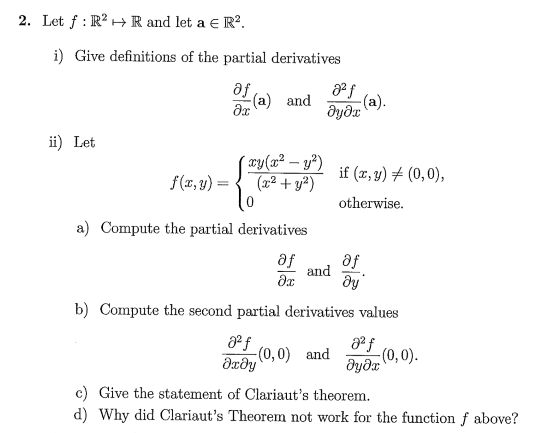Make a Difference – Donate to Bored of Studies!
Students helping students, join us in improving Bored of Studies by donating and supporting future students!
MATH2111 Higher Several Variable Calculus (1 Viewer)
- Thread starter leehuan
- Start date
seanieg89
Well-Known Member
- Joined
- Aug 8, 2006
- Messages
- 2,653
- Gender
- Male
- HSC
- 2007
Re: Several Variable Calculus
The partial derivatives are all zero, but the directional derivatives are as you say for u1 nonzero, and zero if u1=0.
This is one of those funny functions that you don't see the full weirdness of by just looking at 2d slices of its graph. Each partial derivative exists at the origin, but the function f isn't even continuous at the origin!
The partial derivatives are all zero, but the directional derivatives are as you say for u1 nonzero, and zero if u1=0.
This is one of those funny functions that you don't see the full weirdness of by just looking at 2d slices of its graph. Each partial derivative exists at the origin, but the function f isn't even continuous at the origin!
seanieg89
Well-Known Member
- Joined
- Aug 8, 2006
- Messages
- 2,653
- Gender
- Male
- HSC
- 2007
They are, but so what? These are not the hypotheses of Clairaut's theorem.
leehuan
Well-Known Member
- Joined
- May 31, 2014
- Messages
- 5,794
- Gender
- Male
- HSC
- 2015
Maybe it was just my unwillingness to compute any second order partial derivatives because the first order partial derivatives were thoroughly untidy.They are, but so what? These are not the hypotheses of Clairaut's theorem.
Is there any easy way of contradicting the criteria of Clairaut's theorem then?
glittergal96
Active Member
- Joined
- Jul 25, 2014
- Messages
- 418
- Gender
- Female
- HSC
- 2014
Sorry about alt, am on phone. Showing that typical Clairaut hypotheses don't hold doesn't prove that mixed partials differ because its not iff. Just compute mixed partials at 0, it really shouldn't take long.
Sent from my GT-I9506 using Tapatalk
Sent from my GT-I9506 using Tapatalk
It didn't work because the hypotheses of Clairaut's Theorem were not satisfied by that ƒ (I assume you know what typical hypotheses are for it).Oh, that was done in a previous part. I understand your point there...

...albeit this was the question. It's the last part that's of interest.
Last edited:
leehuan
Well-Known Member
- Joined
- May 31, 2014
- Messages
- 5,794
- Gender
- Male
- HSC
- 2015
Goes back up to the above query I suppose. Is the only way of really proving it formally just to brute those second order derivatives?It didn't work because the hypotheses of Clariaut's Theorem were not satisfied by that ƒ (I assume you know what typical hypotheses are for it).
You could probably also do it by computing the second partial derivatives at (x,y) ≠ (0, 0) and investigating their limit as (x, y) -> (0, 0), but there's no need to do that since you've already computed the mixed second-partials at the origin in an earlier part of the question (part b)).Goes back up to the above query I suppose. Is the only way of really proving it formally just to brute those second order derivatives?
leehuan
Well-Known Member
- Joined
- May 31, 2014
- Messages
- 5,794
- Gender
- Male
- HSC
- 2015
I suppose what's really bugging me is the fact that d) is actually asking to explain why b) is true. Looks like more of just a grind rather than testing some nice stuff but I suppose I'll just have to deal with it.
seanieg89
Well-Known Member
- Joined
- Aug 8, 2006
- Messages
- 2,653
- Gender
- Male
- HSC
- 2007
It really doesn't take that long, especially since to prove discontinuity you can just show that approaching the origin via different axes gives a different result, so most terms in the mixed partials drop out from x or y being zero.
I would definitely go via this route rather than by restating the fact that the mixed partials do not match and using the contrapositive of Clairaut based on the wording of the question.
"Because the conclusion of Clairaut's theorem is not true" is NOT what I would consider a good answer to "Why does Clairaut's theorem not work here?".
I would definitely go via this route rather than by restating the fact that the mixed partials do not match and using the contrapositive of Clairaut based on the wording of the question.
"Because the conclusion of Clairaut's theorem is not true" is NOT what I would consider a good answer to "Why does Clairaut's theorem not work here?".
It won't be -x^3. It'll be a different cubic. It will be an odd cubic that satisfies f(pi) = 0.
c) Give a simple formula for f(x)
: } f^{\prime\prime}(x)=-6x\\ \text{so I wanted to keep integrating up to get }f(x) = -x^3\\ \text{But then what? I still have to satisfy }f(\pm \pi) = 0\\ \text{Do I just define a piecewise function to get out of this issue?})
leehuan
Well-Known Member
- Joined
- May 31, 2014
- Messages
- 5,794
- Gender
- Male
- HSC
- 2015
Oh, now that I think about it could it potentially be x(x^2-pi^2)?It won't be -x^3. It'll be a different cubic. It will be an odd cubic that satisfies f(pi) = 0.
Yeah but the third derivative was negative, so it'd be the negative of what you wrote there.Oh, now that I think about it could it potentially be x(x^2-pi^2)?

